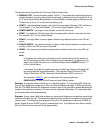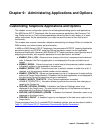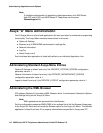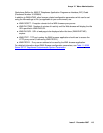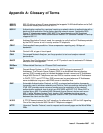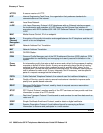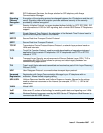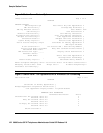
Issue 2 December 2007 117
SES SIP Enablement Services, the Avaya solution for SIP telephony with Avaya
Communication Manager.
Signaling
Channel
Encryption
Encryption of the signaling protocol exchanged between the IP telephone and the call
server. Signaling channel encryption provides additional security to the security
provided by channel encryption.
SIP Session Initiation Protocol, an open standard defined initially by IETF RFC 3261. SIP
is an alternative to H.323 for VoIP signaling, both of which 9600 Series IP Telephones
support.
SNTP Simple Network Time Protocol. An adaptation of the Network Time Protocol used to
synchronize computer clocks in the internet.
SRTCP Secure Real-time Transport Control Protocol.
SRTP Secure Real-time Transport Protocol.
TCP/IP Transmission Control Protocol/Internet Protocol, a network-layer protocol used on
LANs and internets.
TFTP Trivial File Transfer Protocol, used to provide downloading of upgrade scripts and
application files to certain IP telephones. SIP IP telephones use HTTP or HTTPS
instead of TFTP.
TLS Transport Layer Security, an enhancement of Secure Sockets Layer (SSL). TLS is
compatible with SSL 3.0 and allows for privacy and data integrity between two
communicating applications.
TLV Type-Length-Value elements transmitted and received as part of Link Layer Discovery
Protocol (LLDP).
UDP User Datagram Protocol, a connectionless transport-layer protocol.
Unnamed
Registration
Registration with Avaya Communication Manager by an IP telephone with no
extension. Allows limited outgoing calling.
URI & URL Uniform Resource Identifier and Uniform Resource Locator. Names for the strings
used to reference resources on the Internet (for example, HTTP://....). URI is the
newer term.
VLAN Virtual LAN.
VoIP Voice over IP, a class of technology for sending audio data and signaling over LANs.
WML Wireless Markup Language, used by the 9600 Series IP Telephone Web Browser to
communicate with WML servers.
3 of 3



